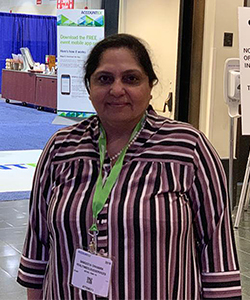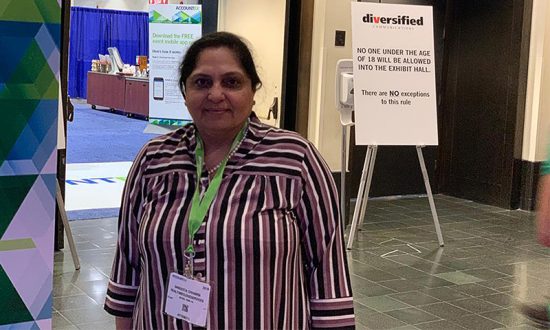Cloud computing offers benefits in several functional areas. However, in few has the impact been felt as keenly as in human resources. “Cloud has completely changed the way how candidates will be screened and shortlisted, how interviews will be conducted, the hiring decisions to be made, and the onboarding training sessions, of course,” says Dr Sangeeta Chhabra, Managing Director of Real-Time Data Services (RTDS), a company that provides advanced IT solutions for communication and cloud computing platforms. In an interaction with CXO Outlook, Dr Sangeeta Chhabra talks about the areas the HR function will be most impacted by Cloud Computing, advantages of using Cloud in HRM, and how is Cloud shaping the future of work, and many more.
With employees suddenly working remotely and little time to prepare, what are the significant challenges HR leaders facing now?
The remote work culture has been into headlines for quite some time now, and it has been adopted successfully by the organisations. Even the HR Professionals responded so well to this shift and managed a rapidly developing workforce of remote employees.
The only significant challenge HR professionals faced was engagement. With remote working, it becomes difficult to follow the regular process, keep a check on employees’ health, to share the updated HR policies pertaining to crisis, and maintain a correspondence between employees and management.
Speaking of HR policies, as a part of employee engagement, we have emerged COVID-related special leave policies and advanced salaries for employees and their families if faced with emergencies.
What area of the HR function will be most impacted by Cloud Computing, and why?
Cloud will impact most areas of the HR process. However, the most impacted function would be talent development and employee engagement. This is the only area that is becoming hard to operate and manage, but here in RTDS, we are continually developing strategies to cope with this challenge.
Cloud has offered a virtual communication platform, where candidates can be connected from any place in the world. Thus, you now have the ability to expand your reach from the local talent pool to the entire globe.
Cloud has completely changed the way how candidates will be screened and shortlisted, how interviews will be conducted, the hiring decisions to be made, and the onboarding training sessions, of course.
What are the advantages of using cloud computing in Human Resource Management?
The most significant advantage of using cloud computing in HR management is communication. It bridges the difference between the HR department and other parts of the organisation. With data being centralised, it can be made accessible to all employees, irrespective of their location.
Companies are starting to benefit from cloud-based HR solutions to ease and automate payroll, recruitment, and talent management. Flexibility is another advantage – HR personnel and employees can work flexible hours, and have access to information even if they can’t make it to the office.
What is the single most dramatic shift you see happening in the HR tech space today?
Technology has been changing rapidly, leaving behind the tedious efforts of our human resource vertical. The critical shift I can see is in the Human Resource Management System (HRMS). HRMS is a type of HR software that has improved the business’s productivity and efficiency through the automation of repetitive tasks. This tech space has enabled most of the major HR domains and whatnot.
The work that required manual accuracy and paperwork is now being done with the help of cloud-based software. This has increased the productivity and efficiency of our HR professionals. It benefits in real-time and accurate performance assessments, increased employee engagement, etc.
How is Cloud Technology shaping the future of work?
Amongst the current cloud environment developments, its flexibility to scale is proved to be beneficial for companies with growing demands. Moreover, with the Cloud, you can leverage the cloud service provider’s infrastructure, which results in no upfront cost.
While data privacy is of utmost concern, public cloud providers nowadays offer high-level data security to protect against data theft and breaches.
Many companies struggle with data loss with no recovery options. In such cases, the Cloud plays a significant role by offering data recovery and backups. Cloud is shaping the future of work in many other ways like automation, increasing team collaboration, and having to access data anytime across the world.
What is the role of cloud telephony in transforming the Human Resource landscape?
Cloud telephony has simplified the functioning of the HR department within the organisation. It automates the hiring process and saves human efforts. Outbound IVR helps generate the outbound calls to the candidates, and their responses can be automatically recorded in the system. The physical presence of the candidate is not required in this case.
Cloud telephony also maintains the privacy of HR and handles the huge volumes of calls by routing them to the concerned HR professionals. While applying for jobs, candidates can call the given advertised numbers, and HR can then align the interviews.
What advice would you give to companies who have been forced to work from home but fear their infrastructure is not fully modernised?
The situation is settling down, and soon the turbulence will come to an end too.
I would recommend the companies to look into Cloud hosting for their remote work requirements. The competent providers would always match up to your local IT requirement, or even provide you with enhanced hosting options like High-Performance Computing servers.
It would be best if you get in touch with the IT professionals and employees and figure out the barriers that hamper the day-to-day work. This is a good practice to ensure everything is in the right place.
About Dr Sangeeta Chhabra
 As Managing Director, Sangeeta plays an active role in designing, developing, and implementing strategic plans that cut costs and minimise delays. She also oversees the financial performance and the day to day operations at RTDS, which includes managing staff, developing business plans, and collaborating with the Board and senior management.
As Managing Director, Sangeeta plays an active role in designing, developing, and implementing strategic plans that cut costs and minimise delays. She also oversees the financial performance and the day to day operations at RTDS, which includes managing staff, developing business plans, and collaborating with the Board and senior management.
She has earned a master’s in economics from the Delhi School of Economics, a Doctorate in Philosophy, in Business Administration and Management, and an MBA in Marketing and Finance. Dr Chhabra has worked for over 30 years as a management practitioner, entrepreneur, and researcher. She has considerable expertise in the Cloud, Cloud Telephony, Healthcare, Handlooms, and Education. Dr Sangeeta has published over 70 research papers and has authored/edited books and articles on diverse topics like development programs, financial analysis, outsourcing, and financial accounting.
As a consultant, Dr Sangeeta has worked in Public Procurement for the Cabinet Secretariat and the Government of India. She participated in a study of MGNREGA and its impact, helped with strategic issue identification for decision making in IT outsourcing, and worked to uncover unaccounted income and wealth for the Ministry of Finance.
She has led several Management Development Programs in the areas of Internal Audit and Control, Corporate Governance, Financial Management, and Budgeting for senior-level management executives in Malaysia, Nepal, Bhutan, Bangladesh, Sri Lanka and India. Additionally, she has chaired sessions in numerous National/International conferences, seminars, and workshops. She actively attends global technology and business conferences such as Accountex USA and GITEX.
Her hobbies include reading, travelling, and gardening. She believes in giving back to society and in caring for the environment. Dr Chhabra does both by participating in social causes and associating with NGOs like Operation ASHA and the Earth Saviours Foundation.
Dr Sangeeta is married to Vinay Chhabra, an alumnus of the prestigious IIT-Delhi with an expansive career in the Indian Revenue Service and is now the CEO of RTDS looking into Technology Infrastructure and new innovations. They have two sons, Sahil and Karan. Sahil is an engineering graduate, and Karan is a Law graduate working with the RTDS associated entity, Servetel Communications, a leading cloud telephony solutions enterprise.


